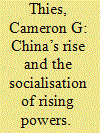| Srl | Item |
| 1 |
ID:
140824


|
|
|
|
|
| Summary/Abstract |
The rise of China, and other states whose material power and ideational aspirations have outpaced that of their peers, presents an interesting challenge to international relations theorists. Structural theories rooted in realism tend to predict that changes in material power inexorably lead to conflict that reshuffles the pecking order at the pinnacle of the international system. Such theories also tend to ignore identity and other ideational factors that may condition the interaction of rising and dominant great powers. This article develops a theoretical approach to state socialisation of rising powers. While considering the importance of increasing material capabilities, this approach also examines the types of roles that states occupy in the international social system and the ability of great powers to socialise rising powers into what they consider to be appropriate roles. The 1995–1996 Taiwan Straits Crisis is analysed through this theoretical framework to demonstrate that although both China and the United States attempted to altercast each other in a socialisation process, neither was successful. China pursued its own, self-conceived role conceptions in the situation, as did the United States, setting the stage for renewed rivalry between the two powerful states. The case demonstrates the difficulty of constraining rising powers’ aspirations when their material power allows them to pursue the identities of their choice, even in the face of strong socialisation efforts from the dominant power and its supporters.
|
|
|
|
|
|
|
|
|
|
|
|
|
|
|
|
| 2 |
ID:
158954


|
|
|
|
|
| Summary/Abstract |
States generate the hardware of military power by either developing new technologies as first mover or adopting demonstrated technology as second mover. Given that military drones have arguably demonstrated effectiveness and thus proliferate, scholars have produced profound insights into today’s second mover dynamics. Yet, the preceding political process of developing this military technology remains poorly understood. The article’s objective is to explain how states become first movers of military hardware. To this end, it applies four causal mechanisms of military innovation studies to the historical trajectory of the development of drones. I argue that security threats initially formed state interests in drones. Yet, capacity was necessary for success. Politically induced transfers and cross-sector diffusion supplied technological progress. At the same time, distributional implications and legacy systems constrained the development process, but could ultimately be overcome. This mechanismic pathway results from the process-tracing analysis of two separate, but related trajectories in Israel and the United States since the 1970s. Given within-case variation, a sequencing and domain-of-application perspective allows the formulation of scope conditions of the mechanisms behind military innovation. This contributes to a historically contingent, yet generalisable, understanding of the political process of how states generate military power.
|
|
|
|
|
|
|
|
|
|
|
|
|
|
|
|